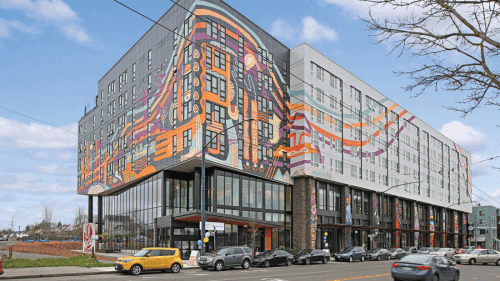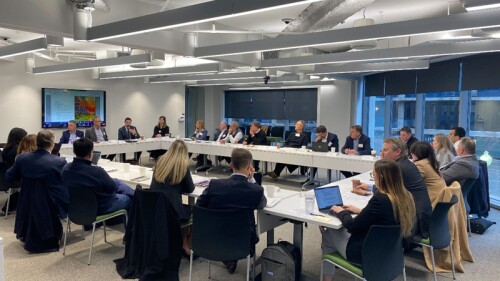San Francisco can create a more commercially vibrant and socially inclusive downtown that attracts a diverse range of industries and employers, advances housing attainability, and promotes stronger leadership, according to findings released by ULI.
The recommendations are the product of a panel of renowned urban planning and real estate experts convened in May through ULI’s Advisory Services Panel (ASP) offering. The panel is a multiday program that is tailored to meet a community’s specific needs, wherein ULI members from across the United States hold in-depth interviews with local stakeholders and deliberate on potential courses of action before making a final presentation of their recommendations. This ASP represents the first time ULI has worked with the City and County of San Francisco and provides an opportunity for communities across the country to learn from the findings.
Following the release of Mayor London Breed’s Roadmap to Downtown San Francisco’s Future, in February the panel was tasked with helping the city prioritize implementation actions and policy changes that will create a downtown neighborhood benefitting San Francisco’s residents, businesses, and the broader Bay Area region. While the panel’s findings are applicable to the entirety of Downtown, the recommendations focused on a 239-acre study area that falls mostly within the city’s historic financial district.
“San Francisco has a track record of responding to challenges by collaborating across sectors and thinking outside the box – it’s time to apply that muscle to the Downtown Core,” said panel co-chairs Eric Tao, managing partner, L37 Development in San Francisco, Calif.; and Kate Collignon, partner, HR&A Advisors in Oakland, Calif. “Our panelists have shown us how city government, community groups, and institutions such as ULI can evolve the current narrative of Downtown San Francisco as a place only for business interests. We can profoundly transform Downtown into a place that welcomes everyone, drives economic benefit, serves as a center for arts, culture, entrepreneurship, wellness, and entertainment beyond 9-5, and reflects the diversity of and is embraced by all San Franciscans.”
Sponsored by ULI San Francisco, the City and County of San Francisco, the ULI Terwilliger Center for Housing, and the ULI Foundation, the panel provided short- and long-term strategic recommendations for leveraging the city’s existing physical assets, identifying opportunities for financial incentives, and implementing public policy reforms that promote the economic and social health of Downtown, with many of the recommendations aligning with key elements of the Mayor’s Roadmap.
Top recommendations include:
- Pursue placemaking and programming to make Downtown a magnet for residents, businesses, and visitors. Ground-plane activation is needed to help transform public spaces and empty storefronts into vibrant city attractions. Revitalized Downtown community spaces will enliven the neighborhood and provide compelling spaces for arts and cultural expression. The panelists recommended specific Downtown destination zones to meet the needs of current and future residents, workers, and visitors.
- Ensure public transit provides comfortable, safe, and easy access to Downtown, along with a welcoming arrival experience. Public transit, including Bay Area Rapid Transit (BART) and Muni are reliable, but the panel recommends an infusion of funding to ensure comfortable rider experiences into and out of Downtown. Enhanced collaboration between the City and BART will be essential to ensure the transit experience, and the surrounding points of arrival downtown, are clean and feel safe.
- Reduce and restructure business taxes to facilitate a diverse mix of companies Downtown. A meaningful reduction in the gross receipts tax, CEO tax, commercial rents tax, and transfer tax will help the city retain its current employers and help attract new businesses. Mayor Breed has initiated a process to identify broader business tax reforms to ensure the city’s tax structure is more resilient and competitive and that will be informed by the panel recommendations.
- Incentivize office to residential conversions to address the housing shortage. Building on recently approved legislation to reduce zoning and building code barriers to adaptive reuse projects, the panel recommends providing a bundle of incentives to catalyze conversions in the short-term, with a goal of establishing a basis for purely market-supported conversions in the future. The city should require some level of affordable housing by reducing other taxes and fees. Incentives could include temporarily waiving impact fees or the transfer tax, providing property tax abatement through the Mills Act or other state legislation, and identifying other direct funding tools.
- Counter the negative narrative about Downtown San Francisco. The panel found the negative narrative about Downtown does not match reality. While the city and Downtown stakeholders have launched a series of focused campaigns to attract visitors and businesses, the city should embark with its partners on a strong and sustained branding and public relations campaign that celebrates Downtown and rebrands it as a vibrant neighborhood, rather than just a business district.
- Build community and governmental capacity to facilitate action. The panel emphasized the importance of coordinated leadership within City Hall to champion Downtown recovery efforts in partnership with stakeholders and the community, building on the efforts of the Economic Recovery and Regeneration division within the Office of Economic and Workforce Development. Enhanced governance and an internal champion will help expedite decision-making and approvals to reduce uncertainty, break down silos, and identify financial tools to attract and drive investment. The panel also suggested building the capacity of Community Benefit Districts (CBDs) to direct public and private resources to implement the recommendations.
“The roadmap the Mayor has laid out for Downtown’s future is a strong foundation for the work we have ahead, and the contributions of this panel of national urban planning experts both affirm and expand upon that vision,” said Sarah Dennis Phillips, Executive Director of the City of San Francisco’s Office of Economic and Workforce Development. “While we’re already moving ahead on many of the ideas called out by the panel, from business tax reforms and attraction efforts to supporting a diverse mix of arts and culture events, I look forward to collaborating with city and state leaders as well as private-sector and community partners to take further actions.”
Tao and Collignon were joined on the panel by Antoine Bryant, planning director, City of Detroit, Detroit, Mich.; Mike Grisso, senior vice president, development and land planning, Kilroy Realty Corporation, San Francisco, Calif.; Paul R. Levy, president & CEO, Philadelphia Center City District, Philadelphia, Pa.; Nolan A. Marshall III, executive director, South Park Business Improvement District, Los Angeles, Calif.; Rico Quirindongo, acting director, City of Seattle Office of Planning & Community Development, Bainbridge Island, Wash.; Geeti Silwal, principal, Perkins&Will, San Francisco, Calif.; Michael Spies, founder, Fuse Strategies LLC, New York, N.Y.; Sujata Srivastava, San Francisco director, SPUR, San Francisco, Calif.; and Carl Weisbrod, director, Lower Manhattan Development Corporation, New York, N.Y.
“We’re grateful for ULI’s work to assemble a team of accomplished industry leaders with fresh perspectives. We’ve already rolled-up our sleeves and begun the work to take the panel’s ideas and shape them into policy,” said Rich Hillis, planning director for the City and County of San Francisco.
A summary of the panel’s recommendations can be found here.




